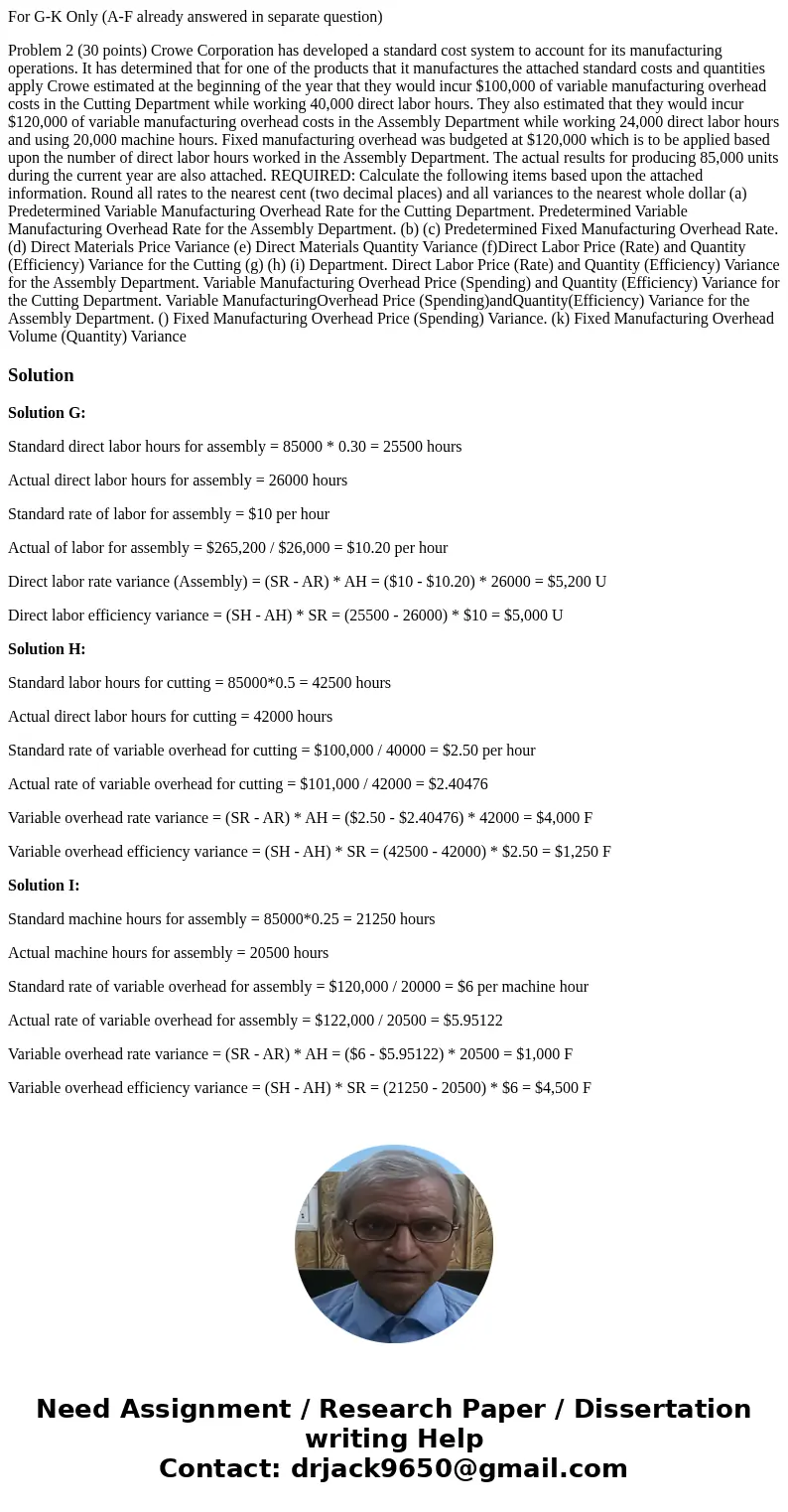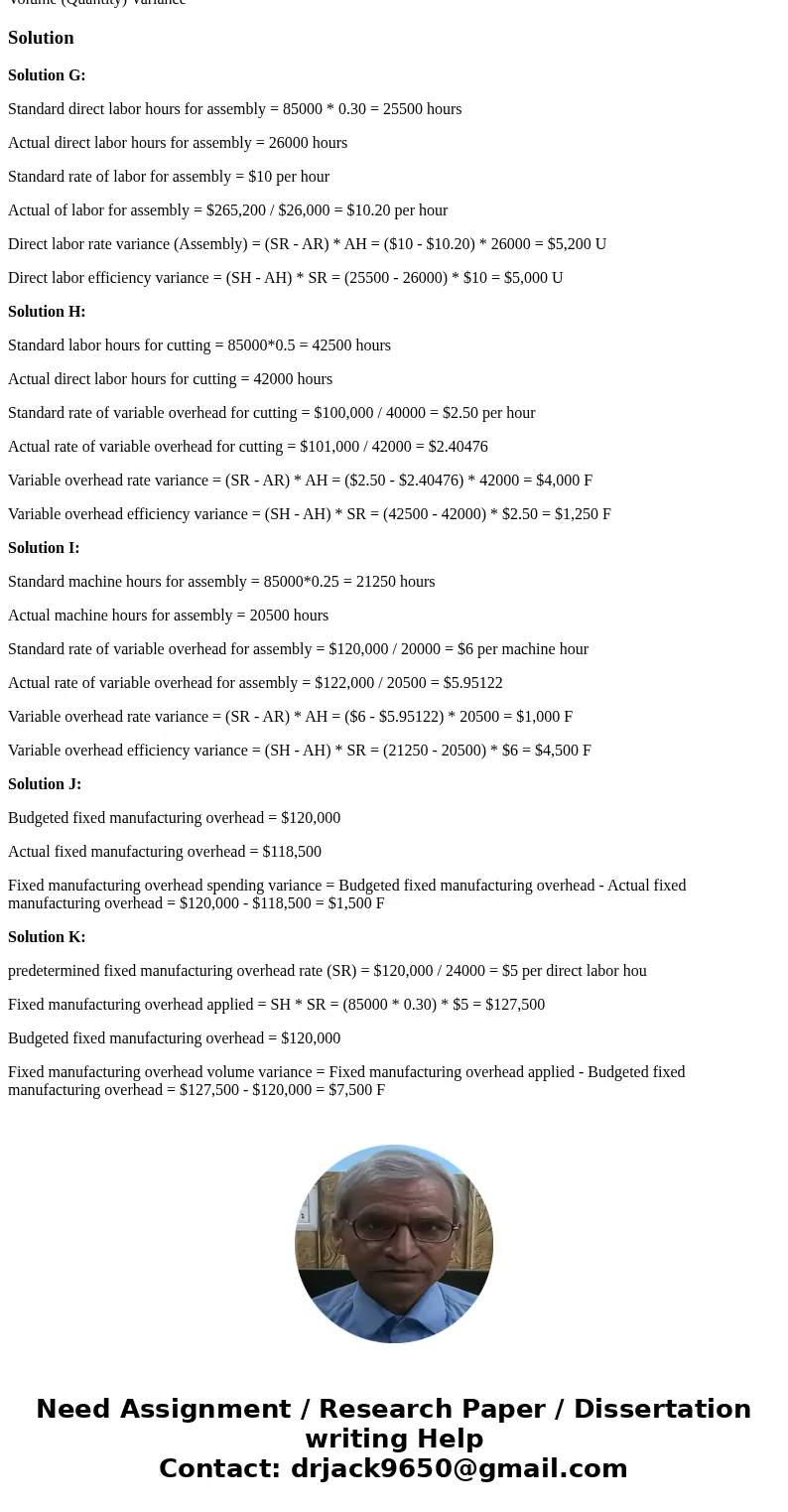For GK Only AF already answered in separate question Problem
For G-K Only (A-F already answered in separate question)
Problem 2 (30 points) Crowe Corporation has developed a standard cost system to account for its manufacturing operations. It has determined that for one of the products that it manufactures the attached standard costs and quantities apply Crowe estimated at the beginning of the year that they would incur $100,000 of variable manufacturing overhead costs in the Cutting Department while working 40,000 direct labor hours. They also estimated that they would incur $120,000 of variable manufacturing overhead costs in the Assembly Department while working 24,000 direct labor hours and using 20,000 machine hours. Fixed manufacturing overhead was budgeted at $120,000 which is to be applied based upon the number of direct labor hours worked in the Assembly Department. The actual results for producing 85,000 units during the current year are also attached. REQUIRED: Calculate the following items based upon the attached information. Round all rates to the nearest cent (two decimal places) and all variances to the nearest whole dollar (a) Predetermined Variable Manufacturing Overhead Rate for the Cutting Department. Predetermined Variable Manufacturing Overhead Rate for the Assembly Department. (b) (c) Predetermined Fixed Manufacturing Overhead Rate. (d) Direct Materials Price Variance (e) Direct Materials Quantity Variance (f)Direct Labor Price (Rate) and Quantity (Efficiency) Variance for the Cutting (g) (h) (i) Department. Direct Labor Price (Rate) and Quantity (Efficiency) Variance for the Assembly Department. Variable Manufacturing Overhead Price (Spending) and Quantity (Efficiency) Variance for the Cutting Department. Variable ManufacturingOverhead Price (Spending)andQuantity(Efficiency) Variance for the Assembly Department. () Fixed Manufacturing Overhead Price (Spending) Variance. (k) Fixed Manufacturing Overhead Volume (Quantity) VarianceSolution
Solution G:
Standard direct labor hours for assembly = 85000 * 0.30 = 25500 hours
Actual direct labor hours for assembly = 26000 hours
Standard rate of labor for assembly = $10 per hour
Actual of labor for assembly = $265,200 / $26,000 = $10.20 per hour
Direct labor rate variance (Assembly) = (SR - AR) * AH = ($10 - $10.20) * 26000 = $5,200 U
Direct labor efficiency variance = (SH - AH) * SR = (25500 - 26000) * $10 = $5,000 U
Solution H:
Standard labor hours for cutting = 85000*0.5 = 42500 hours
Actual direct labor hours for cutting = 42000 hours
Standard rate of variable overhead for cutting = $100,000 / 40000 = $2.50 per hour
Actual rate of variable overhead for cutting = $101,000 / 42000 = $2.40476
Variable overhead rate variance = (SR - AR) * AH = ($2.50 - $2.40476) * 42000 = $4,000 F
Variable overhead efficiency variance = (SH - AH) * SR = (42500 - 42000) * $2.50 = $1,250 F
Solution I:
Standard machine hours for assembly = 85000*0.25 = 21250 hours
Actual machine hours for assembly = 20500 hours
Standard rate of variable overhead for assembly = $120,000 / 20000 = $6 per machine hour
Actual rate of variable overhead for assembly = $122,000 / 20500 = $5.95122
Variable overhead rate variance = (SR - AR) * AH = ($6 - $5.95122) * 20500 = $1,000 F
Variable overhead efficiency variance = (SH - AH) * SR = (21250 - 20500) * $6 = $4,500 F
Solution J:
Budgeted fixed manufacturing overhead = $120,000
Actual fixed manufacturing overhead = $118,500
Fixed manufacturing overhead spending variance = Budgeted fixed manufacturing overhead - Actual fixed manufacturing overhead = $120,000 - $118,500 = $1,500 F
Solution K:
predetermined fixed manufacturing overhead rate (SR) = $120,000 / 24000 = $5 per direct labor hou
Fixed manufacturing overhead applied = SH * SR = (85000 * 0.30) * $5 = $127,500
Budgeted fixed manufacturing overhead = $120,000
Fixed manufacturing overhead volume variance = Fixed manufacturing overhead applied - Budgeted fixed manufacturing overhead = $127,500 - $120,000 = $7,500 F


 Homework Sourse
Homework Sourse